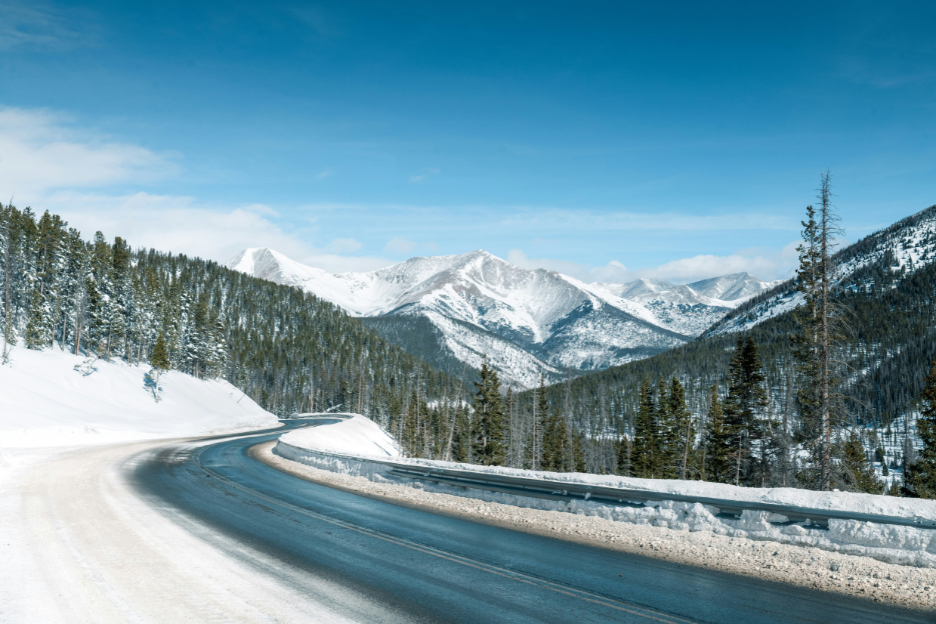As a certain catchphrase from a well-loved TV show goes: winter is coming.
If you’re a driver on our Colorado run (or if you drive the Rockies at all), this means the season of extreme (and potentially dangerous) weather challenges is almost upon us. Rocky mountain highways have twisting turns, can ice over with little warning, and experience whiteout conditions out of the blue.
This isn’t new news to regional truck drivers, of course. You already know that winter mountain driving isn’t for the faint of heart. That’s why mountain hauling requires an extra level of driver skill and training. It also requires significant preparation before the first snowfall ever hits.

Here’s four ways to prepare for winter mountain driving.
Review the latest rules from the Colorado Department of Transportation. Any mountain range is challenging, but the Rockies are in a league of their own. Those steep grades and sudden weather changes we mentioned? Those, and unique challenges like the Eisenhower-Johnson Memorial Tunnel, all mean Colorado truck drivers need to take exceptional care. Add in winter snows, and the Rockies can become an extremely difficult drive.
None of this is lost on the Colorado Department of Transportation, which has an entire set of road rules specifically for Rocky Mountain truck drivers. They’ve also created a series of “mountain rules” videos that are worth your watch. Even if you’re a veteran of mountain truck driving, it’s a good idea to review their website for tips, tricks, and reminders of road rules.
We should mention that every motorist should be aware of Colorado road rules, especially if you’re planning to tackle the Rockies in wintertime!
Check your gear. Every Truline truck gets tuned up before winter arrives, but as a driver, it’s always good to perform extra due diligence and make sure your rig is winter-ready. That goes for all the equipment in it.
Make sure your chains are in top condition. Transport trucks, like all commercial vehicles in Colorado, are legally required to carry tire chains or ATDs at all times on I-70, between September 1 to May 30. Double-check to make sure your chains are still in top condition. If you think they need replacing, let your supervisor know right away.
Make sure these items are on board and/or in good working condition as well:
When winter snow does arrive, make sure to clear any snow debris from your rig during your morning circle check. You should check again every time you stop for a break or for lunch as well.
Even the most experienced drivers are at a loss if they have broken or damaged equipment on their hands. If your gear needs an upgrade, don’t hesitate to bring it to someone’s attention.
Stock your rig. If you get caught in bad weather, you might be stuck at a rest stop for several hours or even overnight. In extreme scenarios, you might even be stuck on the side of the road.
So make sure you’re prepared for the worst that a Rocky Mountain winter can throw at you. In addition to these survival essentials, stock your rig with:
It’s a good idea to make sure your breakdown kit is stocked with extra emergency flares, glow sticks and extra PPE. In a whiteout snowstorm on a mountain highway, the last thing you want to be is invisible!
Plan ahead. When you’re planning your route for the day, make note of every truck stop and big rig-friendly rest area. If winter weather moves in, you’ll know when and where you can safely stop until driving conditions improve. You can also set your GPS to let you know how far away each one is from your current location.Also be sure to check out the weather forecast before you head out. You’ll also want to monitor it throughout the day. Mountain weather can change quickly. The morning forecast of clear skies could quickly change to a lunchtime forecast of blowing snow.
Finally, make note of every chain-up station on your route. Remember, if Colorado’s Commercial Motor Vehicle Chain Law is in effect, you’re required by law to stop as soon as possible to chain up your tires. I-70 has multiple chain-up stations, so be aware of where these are before you set out.
Trust your instincts. If the weather looks bad, then get off the road! No delivery is worth your life-or the lives of motorists around you. Get to the nearest rest stop and wait out the weather. Your safety, and the safety of everyone else, may depend on you knowing when snowy conditions are too treacherous to continue.
Rocky Mountain truck driving takes extra skill and experience, but for drivers who master it, hauling through the Rockies is an exhilarating experience not found on any other route. So why not bring your talents to Truline? Take a look at our current opportunities, and start Rocky Mountain hauling today.